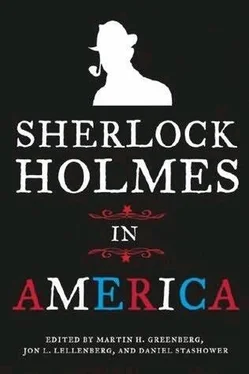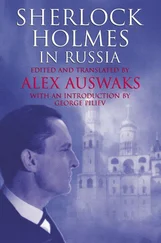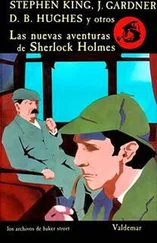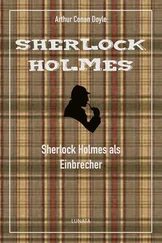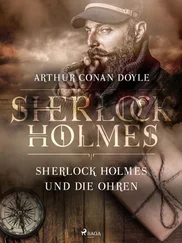“There is another name,” Holmes said. “Jack Wilson.”
“I don’t know him,” Cody said after a pause. “I have so many cowboys that I can’t learn all their names.”
“Jack Wilson is the English name taken by Wovoka,” said Holmes.
“Good Lord!” said Cody.
“Wovoka?” I cried in surprise. “The Indian messiah who started the Ghost Dance?”
Holmes had told me about it once: In a vision, Wovoka, who now called himself Jack Wilson, had come to believe the dance would lead to a new earth, covered with fresh soil that buried the white men. Meanwhile, the Indians would hang suspended in the air until green grass and trees grew upon the soil; and when the rivers ran afresh, and the buffalo again roamed the plains, they would be returned to the land along with the ghosts of their ancestors. It may have been an appealing dream, but while many Indians had adopted the new religion and danced the dance, it was to no avail. The Exposition was ample testimony to the triumph of the white man’s way of life.
“Yes,” said Holmes, “and Kicking Bear and Short Bull were with Sitting Bull when he was killed as a result of his involvement with the Ghost Dancers.”
“Sitting Bull was my friend,” Cody said. “He wasn’t really involved in the Ghost Dance movement. His death when the soldiers came to arrest him was a sad mistake, no more than an accident.”
“That may be, but it seems more than a coincidence to find Kicking Bear and Short Bull in your employ, and Wovoka on the grounds as well.”
“It could be a coincidence,” protested Cody. “Even if not, what does this have to do with the Ghost Dance?”
“You are connected by having taken the first scalp for Custer.”
“The killing of Yellow Hand… ” Cody murmured.
I began to understand. The killing of Yellow Hand was well known to all who had seen Cody’s Wild West show, and it had been of particular interest to Holmes. I had always felt that the reenactment was what stimulated Holmes to read so much about the American West. The event had been a highlight of Cody’s career, and supposedly the turning of the tide against the Indians in the conquest of the American frontier.
“Custer,” said Holmes. “Not bluster. Butler misheard. And you waved Yellow Hair’s scalp in the air.”
“So the conversation Butler recalled had not been about the weather after all,” I said.
“Of course not,” said Holmes. “I realized as much at once.” He turned to Cody. “You still reenact Yellow Hand’s death in your show, do you not?”
Cody acknowledged that he did.
“And the time of the ‘war dance’?” Holmes asked me.
When I told him, he nodded. “That would be about the time the scalping scene would be performed in the Wild West Show. I am sure that is when they plan to burn the cabin.”
“But why?” I asked Holmes.
“Not as revenge for Custer’s death, but for Sitting Bull’s,” said Holmes. “They must see the chain of events beginning with Yellow Hand’s death as leading inevitably to the failure of the Ghost Dance and the death of Sitting Bull.”
“Do you suppose that they will perform the Ghost Dance at the cabin?”
“I do,” said Holmes. “Do you remember the man who left the cabin as we entered, Watson?”
“Yes,” I said.
“He wore a Ghost Shirt,” Holmes said, “which is supposed to make one impervious to bullets. I suspect he will be involved in the dance today.”
“Good Lord,” Cody said. “We must stop them! They will discredit me and all the Indians who work for me if we do not.”
“Watson and I will do our best,” said Holmes.
I hoped that he had some plan to do so, as I could see no way the two of us could prevent the destruction. I feared a panic that would panic fair-goers and cause a stampede like that of the buffalo the Indians wanted to recall.
“You’ll need help,” Cody said.
“You must carry on with your show so that they suspect nothing,” Holmes told him.
“This is Wovoka’s work!” said Cody. “If the others are party to it, it’s because of him.”
“They may not be involved,” said Holmes, “but we must waste no more time. Come, Watson, let us take up our station.”
I did not know what or where our station was, yet I followed Holmes as always. As we hurried along and passed the big show tent, I found myself wishing I had brought my pistol, but I had left it behind in Baker Street. We were, I thought ruefully, a long way from home. I should have borrowed one of Cody’s sidearms, but it was too late for that now. Holmes set a rapid pace, and I was hard pressed to keep up with him.
Between breaths, I asked Holmes what the Ghost Dancers expected to achieve, and how we might stop them.
“I believe they seek revenge on Cody for his imagined part in the events leading to Sitting Bull’s death and the later slaughter at Wounded Knee.”
Holmes’s knowledge of the West’s history far surpassed mine. I knew little of the latter event other than that after Sitting Bull was killed, a number of their tribesmen, including women and children, had been killed in a fight with the U.S. Cavalry at Wounded Knee, in the Dakotas three years ago.
“They may also hope to call attention to their plight,” Holmes continued. “Most of them remain on reservation land no white man wants or could live on.” He paused. “Or Wovoka might merely crave attention. Since the Ghost Dance’s failure, he has lost influence and prestige.”
Holmes was no believer in visions, and thought little of those who held to them, especially when others were likely to suffer because of them.
“We should arrive in ample time to prevent the burning of the cabin,” Holmes continued, though he did not slacken his pace. “Did you not see the Fire and Guard building earlier?”
As always, Holmes’s powers of observation outstripped my own. I confessed I had not. “You were no doubt looking at the Ferris wheel,” he said. “The station is quite near the Indian village, and there are hundreds of guards. Perhaps a thousand or more, though of course not all in one place.”
“You did not mention them to Cody.”
“I was not entirely sure of their competence or presence, though having walked along the Midway, I am now more certain of their numbers. Did you not notice them?”
Once again I had to confess that I had not, though now that he mentioned it, I did recall a number of men in uniform.
“They were recruited especially to make the Exposition safe,” Holmes said. “In spite of my earlier misgivings, I believe we can count on them for help.”
I hoped he was correct. We reached the Midway, which bustled with a multitude of men, women, and children. The crowd at the Ferris wheel was especially impressive. We made our way through them, apologizing as we went, and soon came to the Fire and Guard building. Holmes went up to the door and asked a capped and uniformed young man there for someone in authority.
“I am in authority,” the man said, his scanty moustache fairly bristling. “You can tell me what you need.”
Holmes was not one to truckle, but this was an emergency. Instead, he said, “I believe someone plans to burn Sitting Bull’s cabin in the Indian village. We must prevent it.”
The young man did not hesitate. Fishing a whistle from a pocket, he blew a piercing note, and men ran to us from all sides as well as from within the building. The young man crammed his whistle back into his pocket and began shouting orders.
It was one of the few times that I ever saw Holmes appear dumbfounded. In fact, I cannot remember another. He had not expected such a reaction, but it seemed that the Guard had been waiting for an opportunity to show its value, apart from the usual petty annoyances of asking people for their admittance cards and harassing them for minor violations.
Читать дальше
